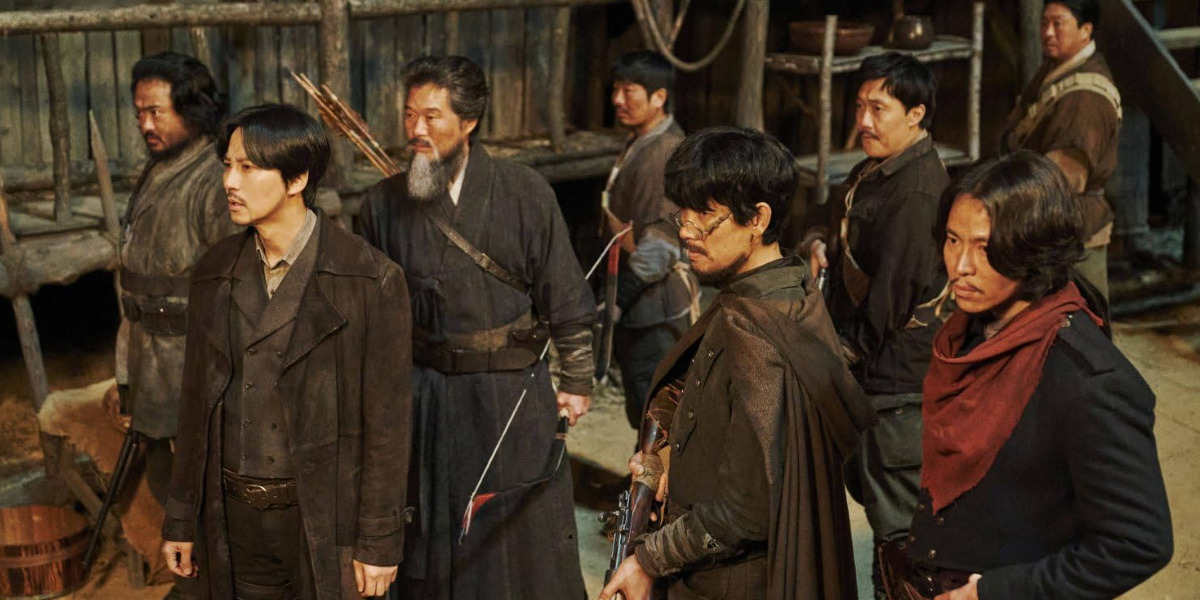Netflix’s South Korean action-drama show, ‘Song of the Bandits,’ charts a Western narrative through the history of Korean/Joseon people during the early 1900s Japanese colonial rule. Casting Kim Nam-gil’s character, Lee-yoon, a former slave compelled to fight for the Japanese army, as the protagonist, the show follows his abandonment of the Japanese rule. Joining forces with local Joseon leader Choi Chung-soo, Lee-yoon builds his own gang of bandits in Gando and fights for the protection of his fellow countrymen. Along the way, the bandits find themselves caught in an insurgent plot against the Empire with double agent Nam Hee-shin, a woman from Lee-yoon’s past at its center.
The show presents a captivating story about Korea’s early fight for freedom with a thrilling central storyline captured through the lens of the classic Western genre. Ripe with gunslinger motifs highlighted through the Joseon people’s oppression under the Japanese, ‘Song of the Bandits’ scrutinizes themes of morality and sacrifice in a time of resistance. Given the show’s historical setting, fans must be curious to know if the story has any basis in reality. Let’s find out! SPOILERS AHEAD!
Is Song of The Bandits a True Story?
No, ‘Song of the Bandits’ is not based on a true story. The show, created by Han Jung-hoon and Hwang Jun-hyuk, is an original story that equips fictional characters and narratives to explore the treatment of Joseon people during the Japanese occupation of their nation. As such, despite the show’s employment of the 1920s as its backdrop, the characters at its forefront are not based on any particular historical figures.

Yet, it is worth mentioning that the show’s narrative pays close attention to its historical context and incorporates noteworthy instances within the Gando region into its storyline to ensure authenticity. For instance, the tumultuous political landscape of Gando as a Chinese land populated with Joseon people under Japanese rule remains true to history. Gando, known today as Jiandao, was home to a majority of Koreans during the 1900s, which resulted in the Japanese establishing their consular police within the region.
The land was known for its local skirmishes between different parties, including some bandit groups. Furthermore, Japan’s widespread violent actions toward the Joseon rebels in Gando, made possible through an attack on the Japanese consulate police, also have rich roots in reality. According to Erik W. Esselstrom’s journal article, a bandit raid in Hunchun, where several Japanese and Korean locals were killed alongside consular police officers, paved the way for the Japanese army’s arrival in the Gando region. As a result, from 1920 to 21, the Japanese army carried out “search and destroy” patrols, which led to the arrest and execution of numerous individuals. The events led to a mass slaughtering of Korean people in what is today known as the Gando Massacre.
The initial Hunchun incident, which serves as the narrative climax for ‘Song of the Bandits,’ has been a controversial point of discussion among scholars for a long time. Many Korean scholars argue that the Japanese army staged the Hunchun attack themselves to justify their large-scale military operations in the area. In response, some Japanese historians treat this as a conspiratorially false theory. The show makes its stance on this argument clear and utilizes the former train of thought to underline its thematic storyline of personal sacrifice for the greater good.
Ultimately, by infusing such an integral historical event into its narrative, ‘Song of The Bandits’ ensures that real-life accuracy seamlessly lends itself to the show’s overall authenticity. As such, the show maintains a sense of realism regardless of its fictionalization of Korea’s history, aided in the same by its impressive approach to the Western genre through well-choreographed fight sequences.
In that regard, the show partially remains true to its settings and delivers a charged atmosphere for its characters and narratives to exist within. Nevertheless, the actual events and characters depicted in the show are works of fiction created to serve one particular narrative. Therefore, we can conclude that despite the show’s authentic approach to its genre and references to real-life events, ‘Song of the Bandits’ is a fictional story.
Read More: Song of the Bandits Ending, Explained


